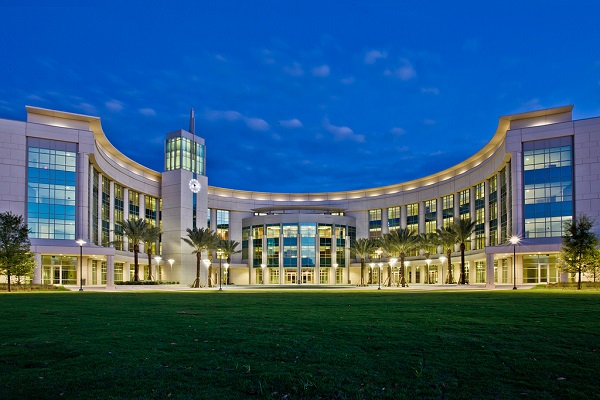University of Central Florida: UCF Forms Multidisciplinary Team to Create Undergraduate Program to Address Gulf Coast Challenges
The University of Central Florida is among six schools selected by the National Academies of Sciences, Engineering, and Medicine’s Gulf Research Program (GRP) for its second funded cohort of the Gulf Scholars Program (GSP). This initiative will engage undergraduate students from any major on campus in addressing the most critical problems facing the Gulf of Mexico region. UCF is joined by Eckerd College, Louisiana State University, University of South Alabama, University of Southern Mississippi, and Texas A&M University at Corpus Christi.
The GSP will leverage UCF’s existing culture of transdisciplinarity by providing students with high-impact research and creative opportunities grounded in social justice and deep cultural awareness. The GSP will begin accepting applications from UCF undergraduate students in Spring 2023. Interested students are encouraged to join the Inaugural Gulf Scholars Fall Forum on Friday, Oct. 14, from 10:30 a.m. to 12:30 p.m. EDT. Students from all majors are welcome. To RSVP for the event please complete this form or visit this site.
The UCF GSP will have one required course for students, which will be developed over the course of the next year, to be taught for the first time in Fall 2023. The new course will be called “The Gulf Uncovered,” and will be developed to immerse students in various topical aspects of the Gulf of Mexico, from creative writing to engineering adaptations to sea level rise. All UCF faculty will have a paid opportunity to develop modules in their area of study, which will be tuned to focus regionally on the Gulf of Mexico. Faculty will be guided through the development of a two-week, team-based learning module, which will be added to a library of content that will be offered in the new course. Faculty should fill out this form if they are interested in learning more.
The program will be housed in the UCF Office of Research’s Faculty Cluster Initiative (FCI), which was developed in 2014 to create transdisciplinary faculty teams (i.e., faculty from a wide array of disciplines) to solve the world’s most challenging societal problems. Program Director Kristy Lewis, assistant professor of biology and member of the FCI’s Sustainable Coastal Systems cluster and co-director Jennifer Sandoval, associate professor of communication, constructed a diverse team of faculty and staff across campus to develop a robust and accessible experience that will engage students collectively with surrounding Gulf Coast communities.
“My hope for this program is that our students learn to work across discipline and difference to solve the complex problems impacting our coastal ecosystems,” Lewis says. “The PIs and supporting faculty of the UCF GSP understand that the impacts from pressures like climate change and increased urbanization are not siloed in one discipline or solved by one person. These horizontal challenges call for horizontal solutions and must involve culturally responsive innovators who embrace diverse perspectives. The UCF GSP aims to fully address these problems by activating the curiosity and creativity that exists in our students from all majors across the university.”
The leadership team includes Andrea Berry, director of Faculty Life in the College of Medicine; Michelle Taub, assistant professor of Learning Sciences and Educational Research and member of the Learning Sciences cluster, and Erica Rodriguez Kight, associate lecturer in Film and Mass Media. The co-directors also identified faculty from five different units across campus to lead the project support team, charged with developing new programming and carrying out program evaluation. The UCF GSP has also established a steering committee made up of seven campus leaders, including the Interim Vice President for Research Winston Schoenfeld.
The UCF GSP’s mission is to educate and mentor the next generation of leaders through an innovative, team-based learning program that will ensure a more resilient and sustainable future for the Gulf Coast region and the people who live there. The $450,000, five-year award will support the creation of a program that provides the student scholars with two years of training, community engagement, mentoring, and direct research experience at no cost. Gulf Scholars will also be awarded a $1,000 scholarship each year and $500 toward their Gulf Scholars Impact Project in their second year. The project will require the Gulf Scholars to co-produce knowledge, research and creative works with non-academic stakeholders to address the most challenging issues facing Gulf Coast communities.
The UCF GSP will have credit-earning and non-credit earning pathways for completing the program with the goal of increasing participation of minoritized students, says program co-director Sandoval.
“We are keenly aware of the barriers that exist for many of our students who are worker-learners, who have care-taking responsibilities, and who are navigating a large-scale university system without a lot of support,” Sandoval says. “We wanted to design an opportunity that balances flexibility and engagement in a way that increases accessibility and provides the right resources for any student passionate about change-making.”
Researchers’ Credentials
Lewis received her doctorate in oceanography and coastal sciences with a minor in experimental statistics from Louisiana State University. She joined UCF’s Department of Biology, part of the College of Sciences, in 2018.
Sandoval received her doctorate in culture and communication from the University of New Mexico. She joined UCF’s Nicholson School of Communication and Media, part of the College of Sciences, in 2011.
Berry received her master of public administration degree from Grand Valley State University and joined UCF’s College of Medicine in 2009.
Taub received her doctorate in psychology (human factors and applied cognition) from North Carolina State University and joined UCF’s Department of Learning Sciences and Educational Research, part of UCF’s College of Community Innovation and Education, in 2018.
Rodriguez Kight received her doctorate in mass communication from the University of Florida and joined UCF’s Nicholson School of Communication and Media, part of the College of Sciences, in 2015.

